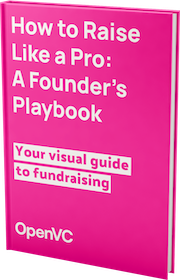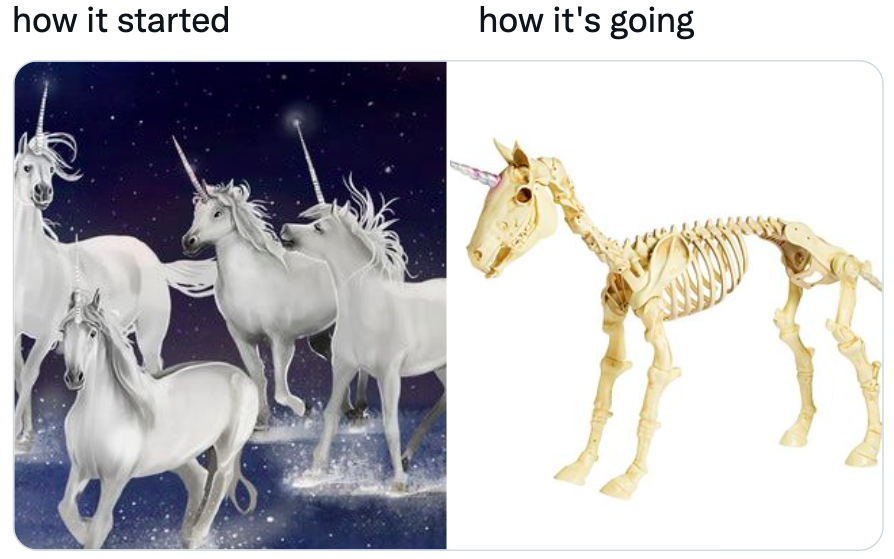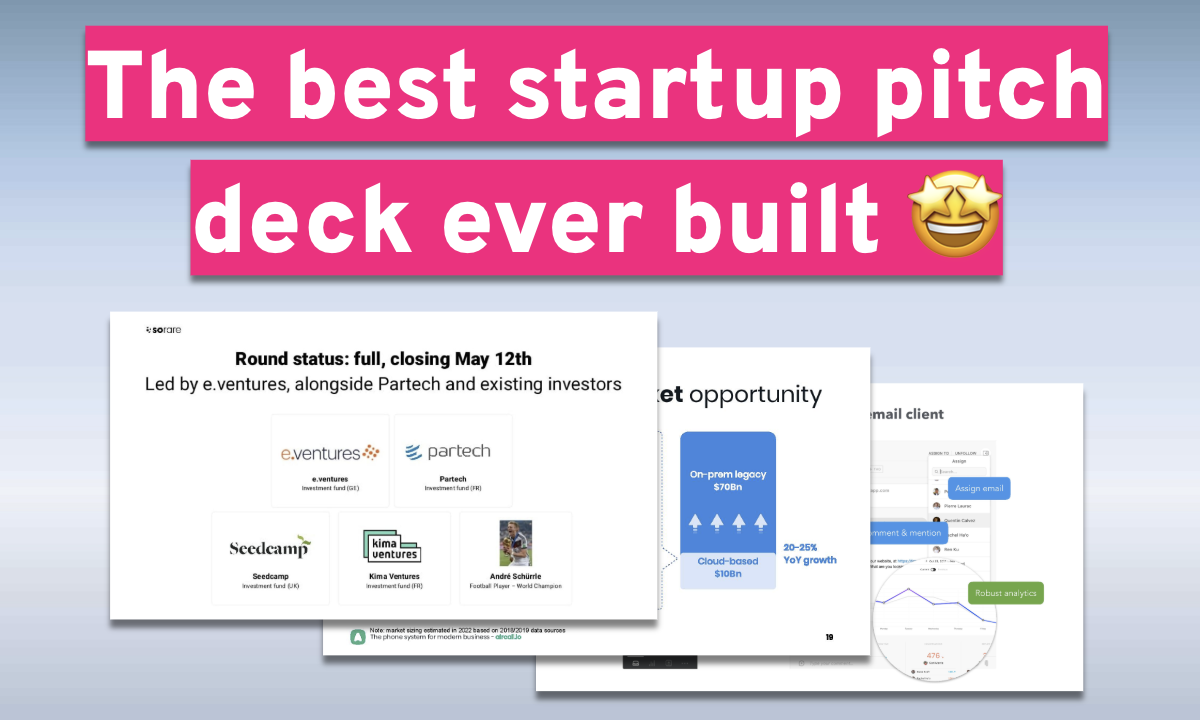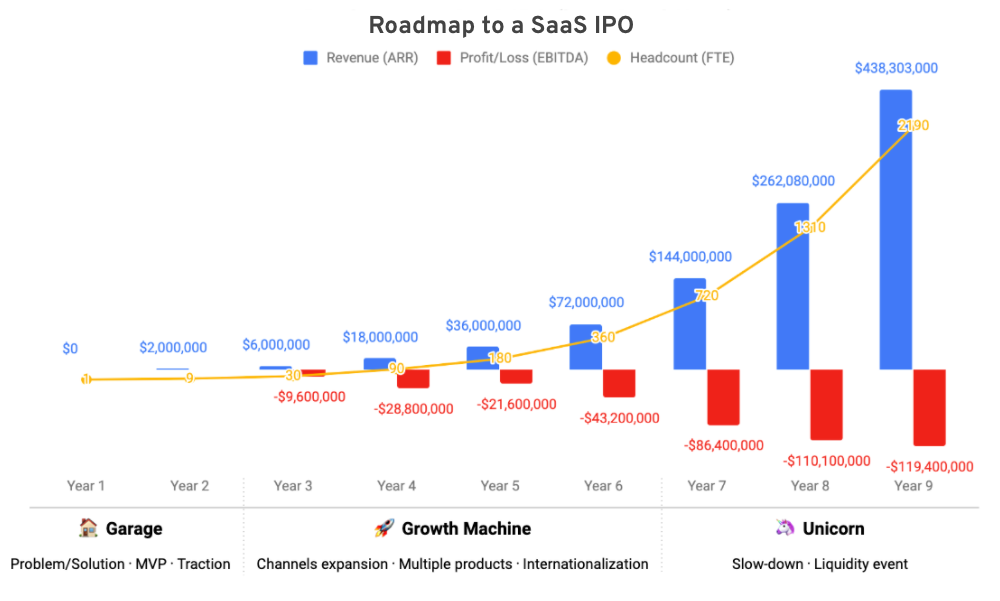The unicorn.
A mythical creature that is beautiful, bold, and ubiquitous. What was once regulated to fairy tales and toys for children has become a behemoth in the world of startup and venture. No term is more coveted, known, or more desired than the unicorn.
What started as a cute definition in a Techcrunch article years ago has ballooned into a modern day land grab, with founders dreaming of becoming a unicorn company and VCs searching to back one in the hope of a successful exit.
But what is this all about exactly?
What makes a company a unicorn? Where do you find them? And what do they mean for the future of the industry?
This is exactly what this article is going to break down.
Table of Contents
What is a unicorn startup?
Who coined the term "unicorn startup"?
“It means something extremely rare, and magical.”- Aileen Lee
The origin of the unicorn goes back to 2013, a year that gave us not only a game changing startup and venture term, but also saw Breaking Bad end (we had no idea that Better Call Saul was in the works but I digress). Venture capitalist Aileen Lee coined the phrase in an article where she examined startups with valuations of over $1 billion.

But before you get all excited about your startup and posting on socials of how you will be the next unicorn to join the herd, take a step back. You not only need a truly innovative idea, a solid plan for mega growth and a way to get your message out to the top venture capitalists, but you also need to be able to deliver on the hype.
Why?
Because of the software startups founded in the 2000s, Aileen Lee estimated that only 0.07% of them ever reached a $1 billion valuation.
“The tech news may make it seem like there’s a winner being born every minute — but the reality is, the odds are somewhere between catching a foul ball at an MLB game and being struck by lightning in one’s lifetime. Or, more than 100x harder than getting into Stanford.”
And don’t forget that even unicorns are not above failure.
RIP Quibi. It was just ahead of its time… or not.
So what exactly makes a startup a unicorn?
The official definition of a unicorn startup
Although there's no official definition of a unicorn startup, the most commonly admitted looks something like:
"a privately held company with a value of over $1 billion."
Now, let's look at the two important points:
- Valued above 1bn. The valuation is defined at the date of the most recent fundraising round, meaning it is not continuous. A startup may have already passed the bar of $1bn, but we will only find out next time they raise funds. Also, raising $500M at a $600M pre-money valuation effectively makes you a unicorn, but one could argue that the numbers are artificially inflated.
- Privately held. Unicorn startups are privately funded and privately owned startups. When they are acquired or go public, they lose the classification. For instance, Uber and Airbnb are not considered "unicorns" anymore because they both IPO'd in 2019 and 2020.
Besides these 2 points, unicorns share a lot of key characteristics.
Unicorn characteristics
In addition to their rarity, unicorn startups share the following characteristics:
- Truly innovative. To be a unicorn, you need to be truly innovative and not just mention the word in a hashtag on your Twitter. Look at the top of the list: from SpaceX to Databricks, it's tech all the way. The products that these companies offer truly innovate industries and deliver on customer demand.
- Customer-focused. Unicorn companies have a strong customer focus, creating and delivering products that customers not only want, but that solve real problems. In the words of Amazon's Jeff Bezos "“We're not competitor obsessed, we're customer obsessed."
- Growth-driven. There is a vision for major growth. More importantly, there is an actual plan to scale that growth exponentially and make that vision a reality. Eighteen years after its IPO and at a whopping $140b valuation, ex-unicorn Salesforce still grows an astonishing 24% year-over-year.
- Industry game changers. Due to their ability to transform the status quo of doing business, unicorn startups are considered industry game changers. By utilizing the latest design, technology and manufacturing processes to create new services and products, unicorns are able to transform whatever industry they operate in. For example ,Uber has used cloud computing, smartphones, and cheap sensors to not only scale fast, but penetrate industries that are traditionally low tech (taxi cabs for example).
All of these characteristics combine to hype up the company, especially among venture capitalists. No one wants to miss out on what could be the next great company (and a possible huge windfall from a successful investment).
Hiten Shah provides a simple valuation formula for investors:
(Founder’s hopes and dreams) x (How fast it’s actually growing) – (Downside protection) x (Investor FOMO)
Simply put, when it comes to a unicorn, investors overlook high burn rates and negative cash flow in exchange for high growth curves and the potential for massive returns (which they absolutely need and we will explore further). This potential massive upside to investors results in them ignoring operating costs and throwing caution to the wind, something which they don’t easily do.
So just how many unicorns are there?
According to CBinsights, as of July 2022, there are over 1,194 unicorns around the world with a total cumulative valuation of ~$3,857 billion. This is purely the result of VC investment and when looking at just the biggest public companies in the U.S. today, many would not have existed without VC investment. And these investments occurred before the unicorn term was even coined.
WOW.
Let’s break this down further.
Unlock the secrets to startup fundraising 🚀
Use our FREE, expert-backed playbook to define your valuation, build VC connections, and secure capital faster.
Access now
Unicorns by country
The vast majority of unicorns are found in the United States, China, and India, followed by the U.K., Germany, France and Israel.
Top unicorns in the US (total: 634)
- SpaceX: SpaceX designs, manufactures and launches advanced rockets and spacecraft.
- Stripe: A powerful credit card processor that helps companies of all sizes to accept online payments easily.
- Instacart: Instacart is a grocery delivery company that allows customers to order groceries from participating retailers with the shopping being done by a personal shopper.
- Databricks: Enterprise software company that provides automated cluster management and IPython-style notebooks
- Epic Games: Video game and software developer and publisher.
Top unicorns in China (total: 172)
- ByteDance: Technology company that developed and owns TIk-Tok.
- Ant Group: Financial services company that owns Alipay, the world’s largest mobile payment platform.
- SHEIN: An online fast fashion retailer.
- JD Digits: Company that works to connect financial and physical industries with digital technology.
- Xiaohongshu: Social media and e-commerce platform that is China’s version of Instagram.
Top unicorns in India (total: 70)
- BYJU’S: An edtech company that offers a learning app for K-12.
- SWIGGY: A food and grocery delivery company.
- OYO: A hospitality chain of leased and franchised hotels, homes and living spaces.
- Razorpay: A payment gateway company.
- Ola: A ridesharing company.
Top unicorns in the UK (total: 56)
- Checkout.com: A fintech that processes payments for other companies.
- Revolut: A fintech that offers banking services.
- Rapyd: A fintech platform for global payments.
- Blockchain.com: A cryptocurrency financial services company.
- THG Ingenuity: Technology company that is the DTC partner of choice for brands looking to connect with consumers through a multichannel commerce
Top unicorns in Germany (total: 24)
- Celonis: A data processing company that offers software as a service to improve business processes.
- N26: A German neobank.
- Personio: Software company that simplifies or automates HR management processes for smaller companies
- Mambu: A software company that provides infrastructure for banks and financial service providers.
- Trade republic: A German online broker that allows for the trading of shares, derivatives and cryptocurrencies on their mobile app.
Top unicorns in France (total: 24)
- Doctolib: An app and website that offers access to French healthcare professionals.
- Back Market: A marketplace for renewed devices.
- Qonto: A French online payment institution for freelancers and SMEs.
- Sorare: A fantasy football game where managers can trade official digital collectibles.
- Mirakl: A cloud-based e-commerce software company.
Top unicorns in Israel (total: 22)
- Wiz: A cybersecurity company.
- Moon Active: A mobile game company.
- Etoro: A multinational social trading and multi-asset investment company that focuses on providing financial and copy trading services.
- Cato Networks: Software company that develops Secure Access Service Edge technology, which combines enterprise communication and security capabilities onto a single cloud-based platform.
- StarkWare Industries: Software company that provides a full-proof stack in generating and verifying proofs of computational integrity in the blockchain.
Unicorns by industry
Although unicorns are found in a variety of verticals, the majority are in four key sectors.
- Fintech leads the pack. One in five unicorns can be found in this vertical (nearly 21%).
- Internet software and services accounts for 19.1% of unicorns.
- D2C and e-commerce companies are next, with 9.1% of unicorns.
- Health accounts for 7.8% of unicorns.
Top fintech unicorns
- Ant Group: Ant Group owns Alipay, the world’s largest mobile payment platform.
- Stripe: A powerful credit card processor that helps companies of all sizes to accept online payments easily.
- Checkout.com: A fintech that processes payments for other companies.
- Klarna: Provides payments for online storefronts and direct payments along with post-purchase payments.
- Chime: Provides fee-free mobile banking services for its users.
Top healthtech unicorns
- Devoted Health: A healthcare company serving seniors.
- Biosplice Therapeutics: A clinical-stage biotechnology company pioneering therapeutics based on alternative pre-mRNA splicing for major diseases.
- Tempus: Advancing precision medicine through the practical application of artificial intelligence in healthcare.
- Caris Life Sciences: Advances precision medicine to provide physicians and patients with information about their health
- WeDoctor: Developer of online and mobile healthcare solutions. The company operates Weiyi, a pair of mobile apps for connecting patients and doctors.
Top SaaS unicorns
- Cloudbees: Developer of a cloud-based platform that provides end-to-end automated software delivery
- Clickup: All-in-one productivity platform that brings teams, tasks, and tools together in one place.
- Commercetools: An enterprise commerce company providing modern cloud-native API-lead offerings.
- Ada: An automated customer experience company that provides chat bots used in customer support.
- Expel: SOC-as-a-service platform that provides security monitoring and response for cloud, hybrid, and on-premises environments.
Top marketplace unicorns
- SHEIN: An online fast fashion retailer.
- OpenSea: The world's first and largest web3 marketplace for NFTs and crypto collectibles.
- Faire: An online wholesale marketplace for retailers and brands.
- Back Market: A marketplace for renewed devices.
- Vinted: A marketplace for buying, selling and exchanging new or secondhand items, mainly clothing and accessories.
Unicorns by valuation
The valuation of unicorns are constantly changing so it can be difficult to keep track.
You might not even realize it, but ByteDance, SpaceX, and SHEIN are no longer even considered unicorns.
Huh?
Why not?
They are now known as hectacorns, companies valued above $100 billion, which is even rarer than a unicorn ranking.
And other unicorns that have exceeded the $10 billion valuation mark (such as Canva and Stripe ) are referred to as decacorns.

Unicorns above a $100 billion valuation (total: 3)
- ByteDance:Technology company that developed and owns TIk-Tok. Valuation is $140 billion.
- SpaceX: SpaceX designs, manufactures and launches advanced rockets and spacecraft. Valuation is $127 billion.
- SHEIN: An online fast fashion retailer. Valuation is $100 billion.
Unicorns between $10-$100 billion valuation (total: 52)
Here are a few examples of unicorns valued between the $10-$100 billion range.
- Plaid : A technology platform providing the tools and access needed for the development of a fully modern, and digitally-enabled financial system. Valuation is $13.5 billion.
- Celonis : Provides an execution management system that helps companies in running their business processes. Valuation is $13 billion.
- Grammarly : An AI-powered writing assistant that helps users to communicate more clearly and effectively. Valuation is $13 billion.
- Brex : A fintech company that offers credit cards and cash management solutions for their customers to save and spend money. Valuation is $12.3 billion.
- Airtable : A cloud-based software company that offers an online platform for creating and sharing relational databases. Valuation is $11.7 billion.
Unicorns between a $1-$10 billion valuation (total: 1,136)
Here are a few examples of unicorns valued at a measly (but still extremely impressive and rare) $1-$10 billion range.
- Alchemy: A technology company that powers crypto related projects. Valuation is $10.2 billion.
- Reddit: A social news aggregation, content rating, and discussion website. Valuation is $10 billion.
- Bolt: A technology company that offers a checkout experience platform. Valuation is $8 billion.
- Cerebral: A mental health telemedicine company. Valuation is $5 billion
- Retool: A provider of a no-code tool development platform. Valuation is $3 billion
Investing in unicorns
Who are the top unicorn investors?
With such high valuations and investments into unicorns that number from the hundreds of millions to the billions, just who is investing?
Well, it isn’t your rich uncle.
Venture capitalists, of course.
Crunchbase has provided the following chart of the VCs who have invested in unicorns as well as their exited unicorn portfolio companies.
And CBinsights has a geographic breakdown:
Why VCs hunt unicorns - and nothing less
As you can see from the charts, VCs need to be unicorn and decacorn hunters.
The small startup with big dreams isn’t going to cut it for venture capitalists.
Why?
Because it is all about the returns. VC is powered by major returns.
Let’s say you invest in a startup and they actually succeed and get acquired at a reasonable valuation. You make a 3x return on your money, not bad seeing as most startups fail. While a 3x return on an investment seems fine and dandy for an individual investor, a fund needs a real return. They have LPs to report to and a reputation to uphold.
So what kind of return does a VC expect?
The higher, the better. The sky’s the limit but let’s say 75x to 100x or more.
VCs need power law returns to be successful. They need an investment like Sequoia Capital’s $60 million into WhatsApp which was turned into $3 billion after the Facebook acquisition (to go further, read our posts on how venture capital works and VC portfolio construction).

Only unicorns and decacorns are capable of such returns and can truly make the VC model work. This is especially the case for funds in the $150 million range and above (which is small when compared to major funds that have billions in assets under management). Every VC is hunting exclusively for startups that will become a unicorn or decacorn.
Jason Lemkin breaks down the cold hard facts for VC funds:
- A $200m VC fund’s LPs are looking for returns of 4X before expenses, so $800 million.
- The fund makes 30 investments in the hope of returning $800 million.
- With 15% ownership on average, the fund needs $5.333 billion in market cap to hit that 4x.
- One or two unicorns at $1 billion won’t cut it, but a decacorn would.
Simply put, VCs need unicorns and decacorns and unicorns and decacorns need VCs. It is a symbiotic (or parasitic, depending on your perspective) relationship.
Unicorns aren’t all magic and rainbows
Just because a company can reach unicorn status, doesn’t mean they will make it in the long run. The unicorn graveyard includes big names such as Quibi, Theranos, and Zynga.
They won’t be the last.
Crunchbase outlines the problem with unicorns by grouping them into fast faders, public market flops, and awaiting a verdict.
Fast faders are startups that joined the unicorn herd rather quickly and then fizzled out.

Remember Clubhouse? It was popular for a minute as it let users join audio rooms with everyone from Malcom Gladwell to Vanilla Ice popping in. Launched in 2020, it was valued at $4 billion within a year.
Now?
When was the last time you heard of it? Tweeted about it? Used it?
But Clubhouse isn’t the only fast fader.
Berlin-based grocery delivery service Gorillas, founded in 2020, raised nearly $1.3 billion in 2021 (at a $3 billion valuation). Yet exits from multiple markets, layoffs, and a focus on reducing cash burn is now the company focus, not exponential growth.
Public market flops occur when those high valuations and magical aspects of unicorns meet the reality of the public markets. One such example is Bird, the scooter rental company whose scooters seemed to be ubiquitous.
Bird went public via a SPAC merger at an expected initial valuation around $2.3 billion.
It didn’t go so well.
Shares currently trade between 33 to 36 cents with co-founder Travis VanderZanden’s stake being worth less than his Miami mansion.
There are multiple unicorns that are awaiting a verdict.
For example, an aggregator of online brand selling on Amazon, Thrasio, had raised $1.2 billion in debt and $2.2 billion in equity in 2021. Yet as of May, the company has canceled its plans to IPO at a $10 billion valuation and has carried out layoffs.
There is also the issue of unicorn glut from the brilliant Jason Lemkin, who defines it as “a massive overhang of growth investments that will take startups years to grow into.”
Vast majority of VC $$ went into unicorns and decacorns the past 2 years, not seed
— Jason ✨Be Kind✨ Lemkin (@jasonlk) June 6, 2022
The issue isn’t just that those deals may be overpriced, it’s that it now may take another 3+ years for many to “grow into their valuations”
That may slow down growth investment for years to come
In their eagerness for huge returns, many growth funds are sitting on companies that may take years to grow past 1x, slowing everything down. Funding of all types will have to slow until we are passed the unicorn glut.
Just another reason why unicorns, as magical as they are, are not above the rules of reality.
What is the best unicorns list?
These days, it seems everyone has a unicorn list. But who has the best list? Whose list is the most comprehensive? Data is constantly changing and if you want to be in the know, you have to have an edge.
Don’t worry, we got your back.
The CBInsights unicorn list
https://www.cbinsights.com/research-unicorn-companies
CBInsights has a great unicorn list that was last updated in July of 2022.
Comprehensive? Very.
Geographies? Global.
Up to date? Last updated in summer of 2022.
Access? Free. Can also be downloaded by providing your personal information.
Information level: Unicorns are broken down by valuation, the date joined, the country, the city, the industry and select investors.
The Wikipedia unicorn list
Wikipedia provides a simple list of unicorn companies for those who need quick information.
Comprehensive? Very.
Geographies? Global.
Up to date? Last updated June 2022.
Access? Free.
Information level:Unicorns are broken down by valuation, valuation date, industry, country, and founders.
The Crunchbase unicorn list
Crunchbase provides a unicorn list that is updated as soon as a startup reaches unicorn status.They also provide an emerging unicorn list and exited unicorn list as well.
Comprehensive? Very.
Geographies? Global.
Up to date? Updated daily.
Access? Free but the exited unicorn list requires a pro account.
Information level: Unicorns are broken down by post money valuation, total equity funding, lead investors, country, and continent.
The HubSpot unicorn list
HubSpot has a list of unicorns and highlights the list of investors who are HubSpot partners.
Comprehensive? Very.
Geographies? Global.
Up to date: Updated as of 2022.
Access? Free.
Information level:Unicorns are broken down by total raised, valuation, country, industry, and investors who partnered with HubSpot.
The EQVISTA unicorn list
EQVISTA has a list of unicorns as well as background information regarding unicorn companies.
Comprehensive? Very.
Geographies? Global.
Up to date: Updated as of 2022.
Access? Free.
Information level:Unicorns are broken down by industry, country, valuation, and select investors.
The Fortune unicorn list
Fortune has a unicorn list that while impressive, is out of date.
Comprehensive? Very.
Geographies? Global.
Up to date: No update since 2016.
Access? Free.
Information level:Unicorns are broken down by valuation, sector, headquarters, founding date, and CEO.
The Failory unicorn list
Failory not only provides a unicorn list, but breaks them down further by city, industry, and even investor.
Comprehensive? Very.
Geographies? Global.
Up to date: Updated as of 2022.
Access? Free.
Information level: Unicorns are broken down by industry, country, city, solo founders, female founders, investors, and more.
The PitchBook unicorn list
PitchBook has a unicorn tracker as well as background information on unicorn companies.
Comprehensive? Very.
Geographies? Global.
Up to date: Updated as of October 2022.
Access? Free
Information level:Unicorns are broken down by verticals, country, VC amount raised to date, most recent valuation, date of becoming a unicorn, and company status.
It isn’t just unicorns anymore.
We discussed unicorns in great detail and also shared hectacorns and decacorns.
But wait, there’s more!
It seems that every other year there is a new startup term making the rounds. Whether you want to be a big time VC or just a founder in the know, we got you covered on the startup taxonomy.
The dragon startup
First up is a dragon.
A dragon is a startup with a valuation of $12 billion or more, net of venture funding. In the hierarchy of startup classification, dragons are beneath hectacorns but above decacorns. Examples would be Epic Games and Instacart.
This isn’t the only definition of a dragon startup. In 2014, TechCrunch defined a dragon as a startup that returned the entire fund. They stated that this was four times as rare as a unicorn.
But wait, there’s more!
Livemint defines a dragon as a startup that raises more than $1 billion from investors in a single round.
However you define a dragon, the main point is that they are ultra rare and ultra valuable.
The centaur startup
Following the dragon is a centaur.
A centaur is a startup in the cloud vertical with $100 million in annual recurring revenue. Centaurs have a great product market fit and lots of paying customers, which means they are more durable than a hot unicorn company that may not seem so hot when the product hits the market (or the company implodes such as Theranos).
According to research conducted by Bessemer Venture Partners, they identified approximately 160 private cloud Centaurs in the world, making these companies about seven times more rare than unicorns. An example of a centaur is Calendly.
The pony startup
Next is the pony startup.
Nothing too magical here.
Coined by Dave McClure, a pony is a startup worth less than $100 million. This makes it entirely realistic and commonplace, hence the name. These are entirely believable creatures that won’t require much research. They also won’t inspire awe if they have an exit.
Other names that fit into the pony category are minicorns (startups with valuations of more than $1 million and are on the rise to become the next unicorn) and soonicorns (startups that have growth potential and the possibility of joining the unicorn club). We checked if there was a maybecorn category but couldn’t come up with any data.
The camel startup
Now we move onto the camel startup (thanks to Warith Harchaoui for bringing this to our attention)..
Camels are startups that exist far away from Silicon Valley (often in emerging markets). They lack the resources and connections that many startups rely on for high growth and high valuations. Yet despite their limited resources (in both funding and human capital), they are able to survive the rough conditions that they operate in. Camels have a long-term outlook, seek balanced growth, and have a diversified business model. Just like their animal namesake, they are able to continue moving through the harshest conditions. Camels not only survive these harsh environments, but can thrive. Other creatures in this environment (in this case, startups), would fail.
The Pegasus startup
Now we have the Pegasus startup.
Coined by serial entrepreneur Jason Calacanis, a Pegasus startup is one that is so profitable that it is able to use its profits to soar so high, that it bypasses multiple rounds of funding. With all this growth and funding talk, it sounds refreshing to see a company grow the old fashioned way by using profits to hire, develop the product, and grow. Here is a blueprint:
- Have a modestly paid, small team that produces an extraordinary product.
- Focus on the four most important things: team, product, customer feedback and growth.
- Charge from the first day of operation and put those profits into growth.
- Triple revenue year-over-year.
Jason mentions DYN.com as an example of a Pegasus, which focused on revenue and then was sold to Oracle, without having to raise multiple rounds of funding.
The zebra startup
Finally, we have the zebra startup.
Like the pony, the zebra lacks any magical qualities. Yet they have a realistic and much needed focus. Zebras are startups that are lean, efficient, and realistic. Whereas unicorns are about disruption and magical returns (and in some cases, magical thinking), zebras are about being profitable and improving society.
Led by the Zebra’s Unite Co-op, the zebra movement seeks to change not only the mentality around unicorns, but around investing as a whole. Here is a useful infographic to explain the key differences between unicorn startups and zebra startups.
Conclusion
It has been almost a decade since the unicorn term was coined. Since then, the market has proved that despite their rarity, unicorns are here to stay. It is essential for founders and investors to understand everything they can about unicorn companies (and their larger counterparts) and whether or not they are worth the hype and risk. Fortunately, we have a step by step guide on how to become a SaaS unicorn. Just remember that despite their rarity, being a part of a unicorn company could change your life.

Unlock the secrets to startup fundraising 🚀
Use our FREE, expert-backed playbook to define your valuation, build VC connections, and secure capital faster.
Access now










